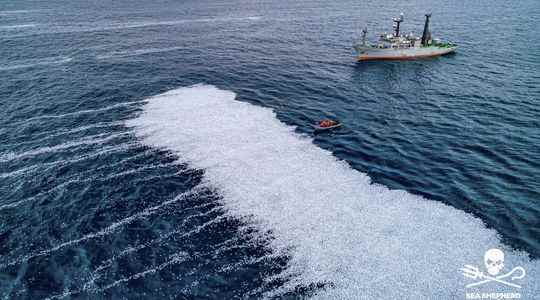A mass of dead fish floating on the surface in the Bay of Biscay. Here is the image of the week published by the environmental NGO Sea Shepherd which resounded as far as the Ministry of the Sea. 300 km from La Rochelle, by the Margirisone of the largest fishing vessels in the world, 143 m long, according to the NGO.
“Today, at 05:50 GMT, a PFA member vessel, the Margiris, reported (…) a fishing incident off La Rochelle, tweeted Thursday evening the European association of pelagic freezer trawlers (PFA Extremely rare, the trawl containing blue whiting, a species subject to quotas, accidentally broke, thus involuntarily releasing fish into the sea”.
Factory ships, “looters” of the seas and oceans
“The ship identified itself at the end of the race. The shipowner recognized an accident on board, it was a net that dropped”, added the Minister of the Sea, Annick Girardin, according to whom ” the accident was declared in the logbook”. The latter also announced on Friday that it had requested the opening of an administrative investigation and “the National Fisheries Surveillance Center (CNSP) to shed light on this subject in order to identify the causes of these significant discards of fish” .
But for the NGO, the problem is the factory ships, like the Margiris. A giant vessel over 140 meters long and over 9000 tons, with a 600 meter net that can cover up to 200 meters in width. These “large fishing vessels on which are imposed, by the European Commission, annual fishing quotas”, as the ministry specifies in franceinfo, are several sailing off the French Atlantic coast. So there is the Margiris but also the Annie Hillina, German giant trawler. In all there are four, according to Sea Shepherd.
And one of them, the Margiris– the second largest trawler in the world – responsible for the release of hundreds of thousands of blue hake, has already been banned from the Tanzanian coast by the Australian authorities for its fishing practices since September 2012. legalization of such ships, we have the longest coastline in Europe, we should be exemplary”, then estimates the president of Sea Shepherd France, Lamya Essemlali, to franceinfo.
These ships only pose a problem in the Atlantic. Further north, in the English Channel, fishermen have been complaining for years about the presence of these “industrial trawlers from Northern Europe in search of the pelagic species that inhabit these waters”, as Stéphane Pinto, sailor described them in 2019. -fisherman in Boulogne-sur-Mer and vice-president of the Regional Fisheries Committee, The cross. the Margiris is thus under criticism from English environmentalists who accuse it of ruining the seabed, reports France 3 regions.
The Minister of Agriculture at the time, Didier Guillaume, had then promised that these vessels would be the subject of “particular attention” from the control services taking into account “their size and their potential impact on the halieutic resource. “.
The problem of bycatch
A practice allocated to these ships is particularly singled out and denounced by Sea Shepherd. It is that of “bycatch” which would be practiced by these vessels, without any real control. “Bycatch is the act of catching another species of fish than the one of interest and throwing it back into the sea. However, this practice is illegal”, explains the president of Sea Shepherd France.
It is nevertheless authorized under a certain quota. Thus, “only an exemption for 5% is authorized, for cases where individuals of another species slip into the shoal of the targeted species”, explains on social networks the MEP Pierre Karleskind, president of the commission. Fisheries (Pech) in the European Parliament.
However, “we are not in this case, obviously, here. This is the consequence of an action which is probably not in accordance with the European common fisheries policy”, he believes. This is also the opinion of the NGO according to which “in the case of the Margiris, we are well beyond 5%.” And the problem is that we have to take the statements of these ships at their word. “We have to take at face value what the shipowners say because we lack control , underlines to franceinfo the president of the NGO. A shipowner has every interest in releasing at sea because in terms of fishing, it’s ‘not seen, not caught’.”
For its part, the PFA asserts in a press release published on Friday to have “implemented drastic measures to prevent this from happening again. The trawl tows are already greatly reduced and the filling sensors have been updated to be in line with the exceptional density of the benches in this area”.
